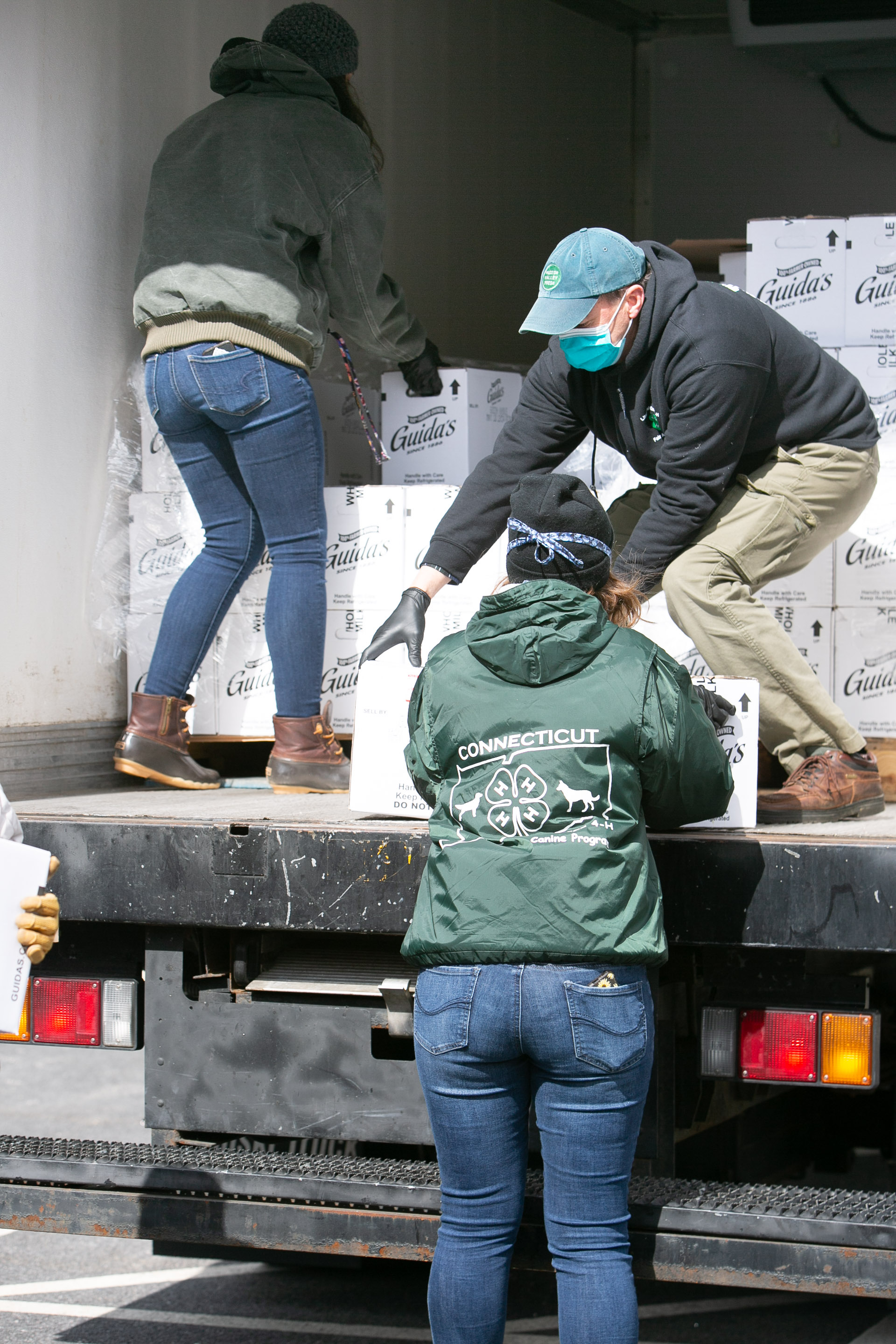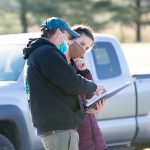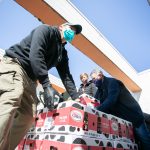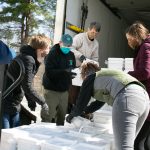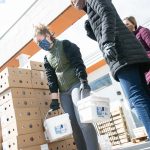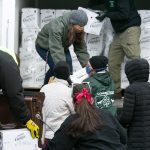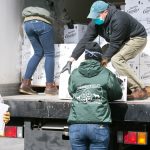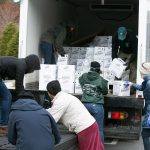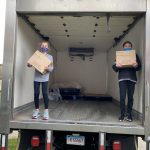What happens when the world slows down — but not for everyone?
Despite the COVID-19 pandemic bringing whole sectors of the economy to a halt, life on dairy farms goes on as usual. This has led to a growing surplus of milk, because many of the usual markets for the product are shut down.
Around 30-40% of fluid milk produced goes to schools, restaurants, and other markets, says Bill Davenport ’85 BS, ’86 MS (CAHNR), UConn Extension educator, and the Litchfield County 4-H coordinator. With so many closures, he says, many dairy processors have nowhere to send the milk – except down the drain.
To help alleviate the problem, Davenport and other extension educators, along with students in the UConn Extension Expanded Food and Nutrition Education Program (EFNEP), UConn 4-H members, and volunteers are doing their best to prevent food waste, support farmers, and feed those in need.
In an effort named Operation Community Impact, surplus dairy products including milk, yogurt, and sour cream are being rerouted to food pantries in Litchfield County, Fairfield County, Hartford County, New London County, Tolland County, and Windham County, serving over 100 food pantries and counting.
Davenport has been involved with dairy farming his whole life, and says it has been difficult to see the struggles dairy farmers are coping with in the face of the pandemic. After milking at his brother’s herd recently, the gravity of the issue came home to him.
“I was being so careful when I filled a bottle of milk out of the bottom of the bulk tank so I don’t spill even one single drop. I cannot imagine opening the valve wide open and dumping the whole tank. Twelve-hundred truckloads of milk are being dumped every day across the country, which is crazy because there are people going hungry in every community. It hit me, we have to do something about this,” he says.
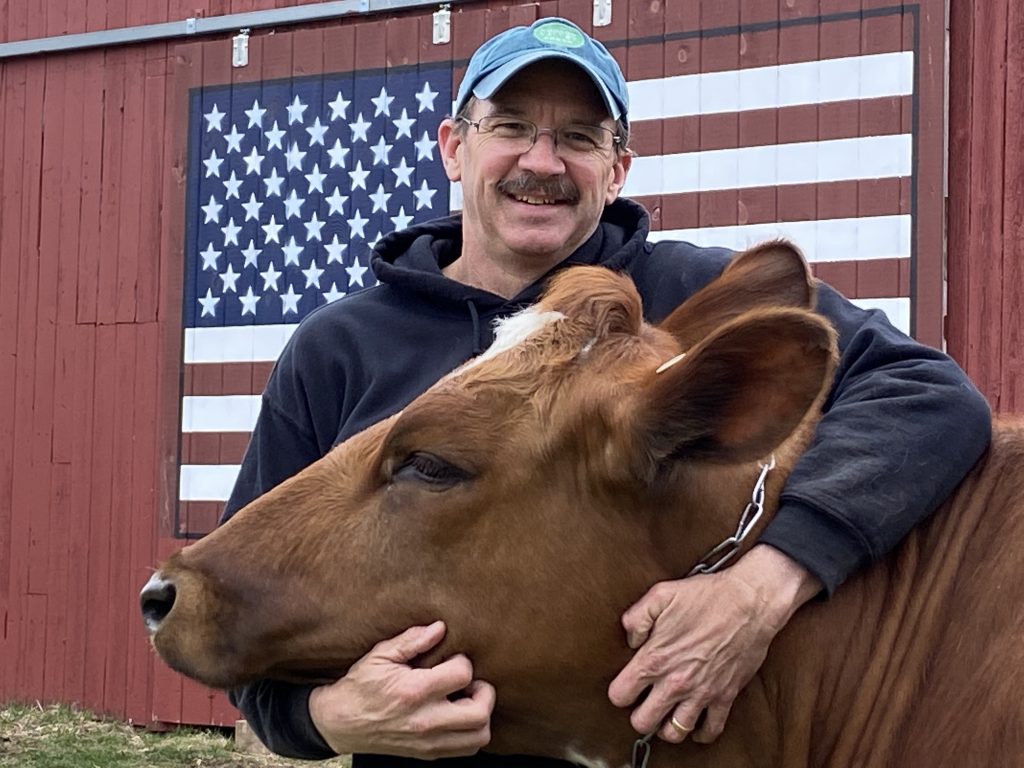
An effort of this size and nature requires coordination and volunteers. The UConn EFNEP and 4-H educators have been tireless in connecting food producers with food pantry coordinators across the state. Food producers that have donated include the Dairy Farmers of America, including Guida’s, Agri-Mark Dairy Cooperative, and Cabot. Local businesses have also donated the use of refrigerated trucks and time to help in the delivery of goods.
Davenport says much of the dairy dilemma lies in the distribution of the surplus milk from the processor to the consumer.
“The product needs to be moved. Food pantries can’t get milk because of transportation, storage, and delivery because the food needs to be kept cold. We hope that by us doing this we can prove that it can be done and we can get it out of the refrigerated truck and into hands at the pantry in 45 minutes or less,” he says.
A big test came with the first distribution, where the dairy processor, Dairy Farmers of America and Guida’s, was unsure if Operation Community Impact could pull off the feat. Impressed by the efficiency of the group, the processor was happy to donate even more food the following week.
May 4th saw the third UConn 4-H dairy product distribution effort since the operation started on April 22nd. By the end of the distribution on the 4th, the amount of food donated from the dairy surplus topped 8,640 half-gallons of fresh milk and over 28,000 pounds of yogurt and sour cream.
Davenport says that in the 2018 Farm Bill, a provision called the Milk Donation Reimbursement Program was written into the bill that would reimburse dairy processors for close to two-thirds of the price of milk of donated milk.
“It is better than nothing, but that program may not be available someday and certainly will not be sustainable for the struggling dairy farmers,” says Davenport.
Besides the waste of food imposed by a surplus in the dairy supply, the other concern is in how the glut of product impacts the price of milk. Davenport says the price of milk was $19 per hundred pounds before the pandemic, and has since dropped to $13 per hundred pounds. Prices are projected to drop further to $10 per hundred pounds, which is potentially catastrophic for dairy farmers.
“$19 per hundred pounds of milk is breaking even for the farmer. If we continue to see the price drop, we could see 40-50% of dairy farms across the country going under. People have no idea how huge an issue this is, as this will have a devastating effect our nation’s long-term food security,” says Davenport.
By easing the surplus, the hope is Operation Community Impact will spread to other areas of the state and region to provide one solution to help prevent plunging milk prices and ease the strain on farmers.
The operation also serves as a great platform for teaching wide-ranging lessons, from the inner workings of the food system to helping volunteers connect with the community. All of this is foundational in the 4-H mission, as well as for land grant universities like UConn.
“This project embodies what 4-H is all about, helping 4-H youth understand, embrace and become an active participant in community service efforts through their years as a 4-H member,” Davenport says. “It is so rewarding to see their willingness to volunteer and the smiles on the faces of the 4-H members as they deliver a donated crate of milk to a family in desperate need for food. There is no more appropriate time to help build this life lesson of caring for others and community service in a time of need than now, during this pandemic.”
If you are interested in getting involved and donating your time, Davenport recommends contacting your local extension office or the UConn EFNEP:
Extension contacts by county: Fairfield – Edith Valiquette, edith.valiquette@uconn.edu Hartford – Jennifer Cushman, jennifer.cushman@uconn.edu Litchfield – William Davenport, william.davenport@uconn.edu Middlesex – Emily Alger, emily.alger@uconn.edu New Haven – Margaret Grillo, margaret.grillo@uconn.edu New London – Pamela Gray, Program Coordinator, pamela.gray@uconn.edu Tolland County – Maryann Fusco-Rollins, maryann.fusco@uconn.edu Windham – Marc Cournoyer, marc.cournoyer@uconn.edu
Another way for people to help is to donate money to established “dairy funds” to help purchase milk directly from the processor at the full wholesale price so that the farmer and processor are able to get their break-even price for the milk. All funds will be used to purchase milk each week to keep the fresh milk flowing to these food pantries and these families in need across the state.
The first such fund to be set up is the Litchfield County Dairy Fund. Donations can be sent to: https://thecommunitycenter.org/donate.php
Others will soon be established across the state as well. To keep up with Operation Community Impact, follow the Litchfield County 4-H Facebook page, or contact Davenport via the email address provided above.
